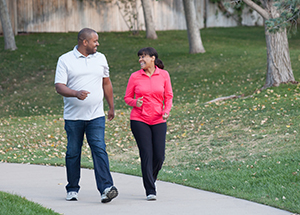Recovery from Heart Surgery: The First Few Weeks
During the first few weeks after heart surgery, you’ll be regaining your energy and strength. Your healthcare provider will let you know what you can and can’t do as you get better. Take things slowly and rest when you get tired.
Walking
Walking is one of the easiest and best ways to help yourself get better. When you walk, your legs pump blood to your heart. This improves blood flow throughout your body. Choose a safe place with a level surface. A local park or a mall are good choices. Start by walking for 5 minutes. Walk a little longer each day. Walking with a friend will make the time more enjoyable.

Driving
Your body needs to heal before you should drive. And your reflexes will be slow for a while. Also, some of your medicines can make you drowsy. Let others drive until your surgeon says you can drive again. Wear your seat belt when you are in a car.
Lifting
For the first to 6 weeks, don’t lift, push, or pull more than 10 pounds ( 4.5 kg). Your healthcare provider may give you specific limits on how much you can lift. Follow their instructions.
Showering
You may feel weak the first few times you shower at home. Ask someone to stand nearby in case you need help. Don't use very hot water. It can affect your blood flow and make you dizzy.
Working
Your healthcare provider can advise you about the best plan for returning to work. You may be able to return part-time to a desk job 6 weeks after your surgery. If you have a more active job, check with your surgeon.
Sexual activity
Sex is generally safe for most people within 2 to 4 weeks after uncomplicated CABG (coronary artery bypass graft) surgery. Talk with your surgeon about when it's safe for you to resume sexual activity.
Your feelings
It’s common to feel a little depressed or frustrated while healing after major surgery. You might feel cheerful and energetic one day, then cranky and tired the next. You may find it hard to concentrate or to sleep. Or you may not be hungry. These things will get better soon. Don’t withdraw from your family and friends. Keep talking, listening, and supporting each other.
What to watch for
Watch for any signs of infection at your incision site. These include:
-
Fever
-
Chills
-
Redness
-
Drainage
-
Foul-smelling odor
-
Pain that gets worse
Call your healthcare provider if any of these occur.
Your provider will show you how to take your pulse. Call your provider right away if you develop a slightly fast, slow, or irregular heartbeat. You may have low blood pressure if you become dizzy but feel better when you sit down. Have someone take your blood pressure or call your provider. If you don't feel better with sitting down, call 911 as below.
Call 911
Call 911 if any of these occur:
-
New or unusual chest pain or a return of the heart symptoms you had before surgery
-
New or unusual shortness of breath
-
Feeling faint or lightheaded, or passing out
-
Pulse (heartbeat) is fast (more than 120 beats per minute) or slow (fewer than 50 beats per minute). Or your pulse is irregular, has extra beats, or skips beats.
-
Heavy bleeding from the incision site, or bleeding that doesn't stop